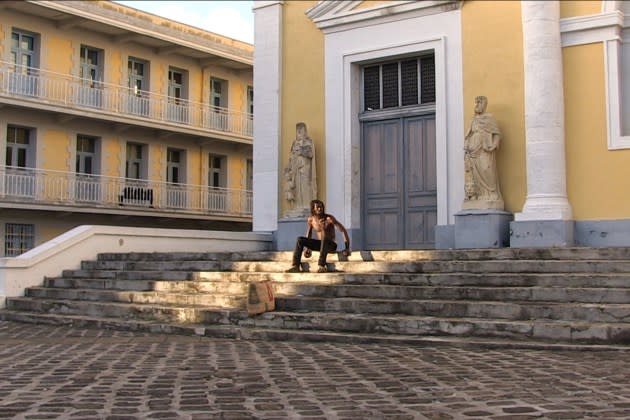Director Malaury Eloi-Paisley on Her Debut Documentary ‘L’Homme Vertige,’ and the Unvarnished Reality of Caribbean Island Life

It took eight years for Guadeloupean native Malaury Eloi Paisley to complete her first feature, “L’Homme Vertige: Tales of a City,” which premieres in Berlin’s Forum. In this debut documentary about her home city Point-à-Pitre, Paisley depicts the unvarnished and often harsh realities of isolated living in the French Carribean island.
In “L’Homme Vertige,” Paisley follows the life of lonely and largely impoverished individuals who wander the city, interrogating them on their views on life, human connection and the island, with the backdrop of the concrete and contaminated landscape of the inner city. For Paisley, “all the people in the film represent a shared unspoken human experience. No one is a stranger, we all embody a similar history. More importantly, I wanted to show that these people are not just victims of a system but have insight into the reality of society and what it means to be free. It’s a simulation between the characters and the city.” Throughout the documentary, Paisley also focuses on the barren and demolished infrastructure on the island, no beach in sight till the end, to “demonstrate the isolation and confinement I felt growing up here. ”
More from Variety
Paisley, who never thought of becoming a filmaker, originally trained in fine arts at Paris’ Sorbonne University. So making “L’Homme Vertige” came as a form of salvation when she returned to Guadeloupe after three years of travel. “As an artist, I felt I will never be able to make it on my own on the island, there was no art center, no conservatory, the idea of going back felt kind of melancholic,” she says.
It was never in her plans to return to the island. However, when Paisley found that the French filmmaking workshop Ateliers Varan was being conducted in Guadeloupe in 2016, she decided to go back. It was at this workshop, with encouragemnt from directing mentors Alice Diop (“Saint Omer”) and Sylvaine Dampierre (“Paroles de nègres”), that she began experimenting with ideas of Guadeloupe’s complex colonial present, loneliness and how humans, the built environment and nature interact in the visual form.
“After my travels to New Zealand, New Caledonia and South Asia, I became even more pessimissitic about the impacts of colonialism that I had seen growing up and realized I couldn’t see the world from a lens where I didn’t see that sense of domination, especially in Guadeloupe, where the French control is very strong,” says Paisley. “I wanted to explore the confinement this history created as well as reconcile the different versions of loneliness in the city, which I do in this film.”
The short Paisley produced at Atelier Varan, “Chanzy Blues,” led to one of the jurors ultimately helping her produce it into a full-length feature that became “L’Homme Vertige.”
With the film’s selection at Berlin, Paisley says, “it’s such a great honor to be able to show this piece of my island in the Caribbean, to filmmakers I admire but also expose it to some people that I feel don’t even know that we are out of here. I hope they see the universal essence in the characters.”
For her next project, Paisley hopes to continue exploring solitude in Guadeloupe, but in relation to local island artists. She also hopes to pursue a film on her paternal Indian heritage and the colonial story of Indian arrival in the island.
Paisley looks forward to her coming ventures. “Now that I have a taste of filmmaking, I have more ideas for cinema with a poetic vision,” she says.
Best of Variety
Sign up for Variety’s Newsletter. For the latest news, follow us on Facebook, Twitter, and Instagram.
